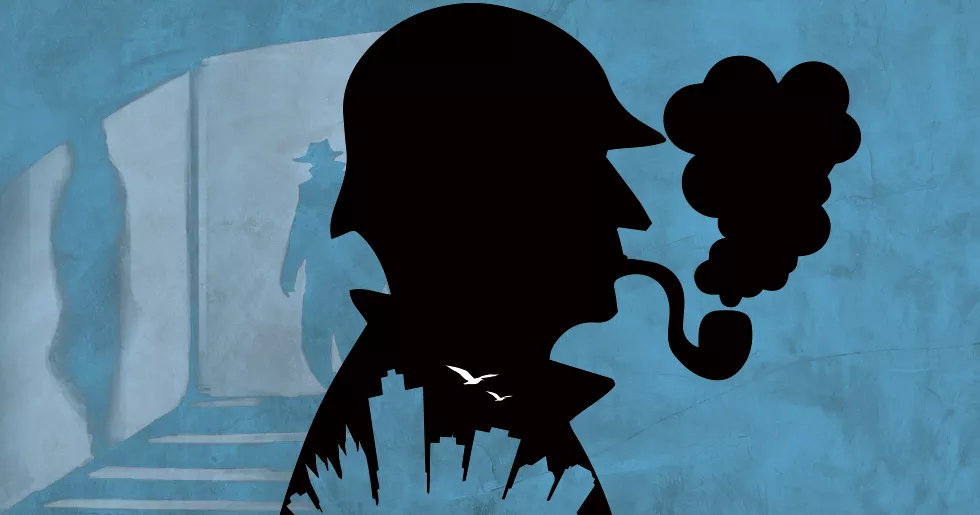Year
The girl didn't want to be found. She quit using social media. A previous runaway, the 15-year-old threatened her family, saying she would claim abuse if they brought her home one more time. "The abuse threat wasn't true—she just wanted to stick it to them," says Scott Fulmer, principal and lead investigator at Fulmer, P.I., a Utah private detective agency. Speaking of the runaway, he recalls, "She was using drugs. Her family cared about her. They wanted to give her emotional support and put her in rehab."
Along with missing persons, Fulmer has spent 30 years investigating cheaters, frauds and crooks. "Usually, with a runaway, you flood the area with fliers and searches," he says. Realizing that this girl was determined to stay missing, Fulmer researched her past social media posts and employed facial recognition software. With his sociable manner and fresh-faced, everyman good looks, it's easy to picture Fulmer blending in at any back-to-school night or neighborhood picnic. It also makes sense that his disarming persona and calm conversational manner would help him elicit information during investigations.
In the runaway case, conversations with the subject's friends and acquaintances helped him discover that the missing girl was living with a man in Brigham City. Fulmer also spoke with local informants who were often, "people who live on the fringe of society." He learned that the man worked at a Brigham City restaurant. He conducted surveillance on the man's house. For several days, he saw nothing. Then, on a rainy afternoon, the man and a passenger drove out of his garage and headed into town. "They ran a couple of errands, but it seemed like everywhere they went, there was a drive-thru." He could see the driver, but not the passenger. Finally, when the pair stopped at a gas station, Fulmer shot a video showing that the girl had cut her hair and tried to change her appearance. "My next step was to call the authorities and have her picked up."
The runaway's experience falls in the one-third of Fulmer's cases that involve missing persons and infidelity situations. Another third includes workman's compensation and disability fraud. The last third covers business issues such as trademark infringement. In chasing alleged cheaters, Fulmer says that when someone suspects a spouse of cheating to the point of hiring a private detective, the suspected cheater most often is, well, cheating. But not always. One Salt Lake woman suspected that her husband was having an affair during his lunch hour. She could never reach his cell phone during that time. "He worked at a manufacturing company," says Fulmer, who surveilled the man several times during the noon hour. "Every time I watched during that time, he walked out to his car, rolled down the windows, turned off his phone and took a nap. There was no evidence that he was seeing anyone." He adds, "Sometimes, a client's suspicions turn out to be true. But at other times, it's all in their head. Often, the truth isn't known until they hire a private investigator."
He explains that proving an affair—and surveillance in general—doesn't happen as smoothly as it does on TV. If a man wants to take his wife's infidelity to court, their stories could easily conflict. "The husband might claim his wife has been seeing this guy for 13 months. She could say it was just that one time. I need to show video of successive areas and locations and times to prove that it is what it is." He adds that, in infidelity cases, typically there is no smoking gun. "We're often able to document a couple entering a hotel or kissing in a parked car. But it's rare to actually film anyone having sex." Yet, after days of trailing a man named Chase with no result, Fulmer followed him to an area behind a Lowe's home improvement store. Fulmer was surprised when a redheaded woman drove up in a black Audi. Her long auburn hair was swept back into a ponytail and she wore black yoga pants that reached just below her knees. "She had a derriere so tight you could have bounced a quarter off it and put your eye out," Fulmer recalls. Chase climbed down out of his white Hummer and was leaning against his vehicle when the two began embracing. Fulmer was conducting surveillance at the eastern end of the building. He felt sure he couldn't move closer without the couple suspecting his presence. But he got out his camera. "That's when I got an eyeful," he recalls. The woman, who turned out to be a yoga instructor, knelt down and unbuckled Chase's belt. "You can guess what happened," Fulmer says. "Right there in the parking lot behind Lowe's close to the dumpster." He knew his client would be heartbroken. "But she needed to know. She had to know."
Fulmer's seen women cry. Men, too. He says it gets to him when the men cry. "Sometimes, I want to say, 'Come on, buddy.'" One man from Kaysville who had been married for 25 years wanted Fulmer to meet with him right away at a hotel in Layton. The money for Fulmer's retainer was sitting on a nightstand. The potential client said his wife was having an affair and wanted Fulmer to prove it. "I did some surveillance and did catch her having the affair." But when Fulmer's final video depicted the woman planting flowers in the home where she and the man had raised their children, somehow, this familiar domestic act gave the client pause. "When I said she was planting flowers, he said, 'Never mind. I just can't do this anymore. I don't know what I've done to fail her.'" And that was that.
He adds that an affair can affect not only a divorce, but could also weigh in on alimony and child custody. "In Utah, the only way you can stop paying alimony is to prove cohabitation," the detective says. He recalls an instance where a woman had her lover's garage door opener and would park in his garage. Fulmer knew from the many times that she came and went from the man's carport, "That she wasn't there just to redo the draperies; she was obviously comfortable there. I have to prove that the couple is living in what the court would see as a spouse-like relationship." He admits that his work takes time—and requires money. He offers a free consultation to potential clients. Before taking on an infidelity case, he asks lots of questions, such as, "What is her schedule? When did things change? Are there any kind of medical issues?" Once he decides to take on a case, he usually charges a $2,000 retainer up front. His hourly rate is $85. "When you go to a doctor, do you want the cheapest one, or the one on the staff of Boston General Hospital, if you can afford him?" If someone says they just have $500, he will say, "We can do that. But I'm not sure if it will give you peace of mind or not. What if that is the one time when she isn't with him?"
Real-life cases take much more time than those of TV P.I.s, who, Fulmer says, are never portrayed as sweating or sitting hungry in the car. And during surveillance, if it's raining, "you have to be able to film and drive without killing yourself."
In his new book, Confessions of A Private Eye: My Thirty Years Investigating Cheaters, Frauds, Missing Persons and Crooks, Fulmer recounts how, in his early surveillance days, "I made just about every possible mistake in the book. I lost my subject constantly. Someone called the police because I set up a stationary surveillance position that seemed out of place. Once, as I moved from the front seat to the back seat, I accidentally hit the car horn with my rear end. Neighbors walked out to the car and asked if they could help me. One even brought me a cold drink, saying it was much too hot to be out there doing whatever I was doing."
Yet as time passed, his tools—which now include all kinds of apps, a video camera about the size of a key fob, a covert camera, a GPS tracker and a PDF converter—and his skills improved. He now knows that if he follows someone into a restaurant, he can't let the hostess seat him just anywhere. He looks for the people he is surveilling, then tells the waitress, "I'd like to sit over there." He pays his restaurant bill at the beginning, when he orders his food, asking, "How about if I pay now?" That way, as soon as the subject leaves, Fulmer is free to go, too, without losing any time.
He has owned his own firm since 2006 and began by working for other firms when he lived in Texas. He's seen P.I.s from all walks of life, "a local DJ, a drama teacher, a housewife." To be a private detective, he says, it helps to be a self-starter, to have a natural curiosity and a rapport with people. "It also takes a lot of patience to sit in a car for eight hours. You are by yourself on surveillance, but then you have to get out of the car and talk to people." It helps to be good at keeping secrets. "Some people are so verbose they tell everything that's going on," he says. "You need to write and communicate well and have a good bladder."
Fulmer eats a good breakfast in the morning—sometimes hitting a breakfast buffet—and takes along lots of water, nuts and fruits during surveillance. "I rarely get bored. My mind is always going 100 miles an hour. I can't crack open a book, but I can listen to talk radio and audio books." It's important to have superior powers of observation, he says. "On a workman's comp case, if you're at the subject's house and his grass is overgrown, you know he's probably going to mow his lawn. If there is Quikrete, a project is probably going to happen."
Fulmer's powers of observation truly came in handy on a case he calls "the great tortilla caper." This wasn't a case of a missing person. It was a case of missing tortillas—thousands of dollars worth. Along with the tortillas, tacos, bottles of salsa and jalapenos kept disappearing, too. "I'm talking about $20,000 of missing product," Fulmer says. Caliente Sabroso Foods is a major wholesale distributor of Mexican food products to restaurants and grocery stores throughout the southwestern United States. The Estrada family began producing pork tamales and fresh flour tortillas in the kitchen of their home. They initially sold them to friends, neighbors and co-workers. The business soon took off and eventually grew into a multi-million dollar business offering more than 30 types of products.
Fulmer met Rocky Sepulveda, a senior facility manager, at one of their food production plants. Sepulveda figured that the company was losing about two pallets of product a week—some $3,000 worth. "It was such a small amount that it had gone unnoticed for several weeks until it was finally recognized as an irregularity in a normal monthly audit," Fulmer recalls. By then, the company had already lost an estimated $10,000 worth of Mexican food. The amount was small compared to the millions Caliente Sabroso made each year. "But it also meant somebody was stealing from the company. And Rocky wanted to put a stop to it," Fulmer says.
Walking through the warehouse, the private eye noticed outdated security cameras and major dead spots that the cameras could not observe. He saw that the warehouse didn't have an alarm system and their key control procedures were problematic. "Given the size and resources of the company, this surprised me," Fulmer says. He concluded that the thefts were most likely an inside job. "Someone had probably made an extra key and was returning after hours to load up on product," he says.
Positioning himself in an empty building across the alley from the Caliente Sabroso warehouse, Fulmer conducted surveillance on random evenings for a week or two without success. Then, shortly before midnight, on a foggy evening in late November, a lone male figure suddenly walked through the fog in Fulmer's direction. "He walked quietly toward the warehouse, ascended the stairs next to the main loading dock and then came to a stop at the warehouse door. "He then turned and looked right at me. I think my heart skipped a beat," Fulmer says. But the man couldn't see him in the dark of night. Fulmer watched the man remove a set of keys from his pocket. Then the private detective grabbed his cell phone and contacted another investigator who was stationed inside the warehouse. That man shot videos of the thief slithering around and hugging the walls to avoid the security cameras. From the empty building, Fulmer suddenly saw a U-Haul truck pull up behind the loading dock. The first thief opened the door for the one driving the truck. Fulmer watched as the two men loaded two full pallets of Mexican food products into the back of the truck with ease.
The two thieves used the same modus operandi the following Wednesday. And on the Wednesday after that, they tried it again. But this time, the company was ready. The bandits were busted mid-thievery by detectives and police officers who jumped out with guns drawn. He was right about his inside job hunch. "Both bandits were current employees. One was even a shift manager who had an extra key," Fulmer says. He was also right in guessing that the two men were selling the supplies to local mom-and-pop restaurants for pennies on the dollar.
Fulmer has studied human behavior such as the power of habits and body language. He says he can watch two people walking down the street and tell which is the dominant one in the relationship. He says that understanding the power of habits has helped in his surveillance work. "About 45 percent of what we do is based on habit. People often take the same route home from work every day. I always shave the same side of my face first and always put my left leg in a pair of pants first." Having worked and lived in other states, he says that Utah is most often "typical small town U.S.A. I have to be careful in smaller cities, like Heber or Midway. Some people want to know why you are there."
A positive aspect to being a detective in Utah is that, "People are very kind, nice and trustworthy. It's kind of a down side that when I'm driving around, I see 5 year olds walking down the street by themselves."
In a fraud case where an insurance company hired Fulmer, a mother and daughter were hit by a utility truck. The utility company was paying their medical bills and wanted to settle the claim. But the mother claimed that she and her daughter had suffered severe and possibly permanent injuries. "She called the claims adjuster weekly. She wanted more money. She wanted a car. She wanted a different doctor," Fulmer says. He began investigating and discovered that information a neighbor of the mother and daughter had passed along to the insurance company was correct. Their injuries were minor. The daughter turned out to be the star of the high school volleyball team. One night, Fulmer attended one of her games. "She crouched down and then sprang up quickly, extending her arms and using her fingertips to set the ball for one of her teammates. Best of all, she absolutely slammed, and, by that, I mean viciously clobbered the opposing team with several brutal spikes," he says. Each spike was accompanied by a high-pitched blood curdling grunt that reminded Fulmer of his days spent in bayonet training in the Army. "Every time she did this, the crowd went nuts. The girl was talented. And I got it all on video." If the girl was talented, her mom was her greatest cheerleader. "Every time the daughter did something amazing, which was regularly, her mom literally jumped up and down," he says. "She would also yell and wave her arms high above her head. She would then begin clapping and turn to face the audience as if to say, 'That's my daughter!'" Due to the video evidence he collected, the pair didn't receive the huge financial windfall they were anticipating. In fact, they were forced to settle their claim and received a significantly smaller monetary settlement more in line with their actual injuries. Fulmer adds that insurance-fraud situations like theirs cost the American public approximately $80 billion a year. "And we wonder why insurance rates are so high," he says.
Fulmer does what he does because he has a desire to solve mysteries and to help people find closure and peace of mind. "In many ways, I'm still that blond haired little boy disappearing behind the library book shelves to revel in the stories of mysteries solved," he says. "I've been fortunate enough to make a living at what I love to do." His wife, Valerie, is also a licensed P.I. who often handles reports and administrative details of the firm. It's been a good life. Yet there are times when he feels strained. Fulmer sees the worst of humanity when people lie, cheat and commit fraud, assault and abuse. "I grow weary of trying to come up with last-minute practical solutions to other people's desperate problems," he says.
"The ongoing stress of handling multiple investigations and the unrealistic expectations of clients can be emotionally exhausting," he continues. So, does he have an exit strategy from this business? "That's easy. Death." he says. "I can't imagine doing anything else. I'll keep doing this as long as I can."






